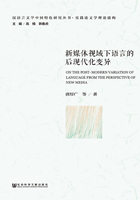
Abstract
The new media have brought great changes to language. Philosophically, the variation reflects the influence of such post-modern ideas as diversity, fragmentation, marginality and fuzziness embodied in antirationality, antiauthority and anti-center. By studying the Cyberculture, the Popular Language, Pop Network Style and Appellation, the paper is to reflect on the lin-guistic influence of postmodern thoughts via the new media, as well as the role of language standardization in this transformation. It is aimed to find a balance between rich expressions and standardized language so as to meet the need of communication and language development.
The network language absorbs the information from the different sources. It was symbolized and fixed. All that make our communication richer and more vivid. In network language, there is also a phenomenon of inverse symbolization, that is the Martian Text. The network has a fast propagation speed and a wide range of effects, so the variation on the popularization of language is inevitable. Network language has strong dissimilarity, this is the needs of the internet users highlighting their own value, attracting attention, and achieving the successful communication. There are great ideals on the network communication. People in the virtual space, throw away their identity, so that the language of taboo and polite can go to a minimum.
Popular Language is a popular form of discourse in a certain period of society, regional and social groups(mostly youth groups). Popular language is the barometer of social culture, which is a kaleidoscope of the world. It can be accepted by the public, and it becomes a language variant that the people are pleased the see, which has its profound social background.
Popular Style is a kind of style, which is able to reflect a period of social phenomena, especially social hot phenomenon of discourse patterns. In essence, it is a kind of imitation, which is the process of grafting the virtual world to the real world, that makes the language of pragmatic effect increased and more expressive.
The variation of Appellation in the perspective of new media is reflected in two aspects: one is the generalization of kinship address, and the other is the change of social address. With the emergence and popularity of new media, the appellation changes constantly, mainly because of the influence of social culture and the change of people's values and psychological tendency.